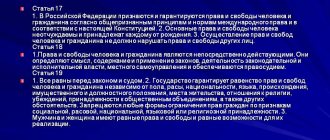Chapter 19 of the Criminal Code of the Russian Federation lists crimes against the constitutional rights and freedoms of man and citizen. Many of them are quite rare in practice, especially those related to violations of election legislation, but there are also common ones, such as Art. 143 of the Criminal Code of the Russian Federation, art. Art. 145 and 145.1 of the Criminal Code of the Russian Federation concerning the sphere of labor relations, there are also such as Art. 138.1 of the Criminal Code of the Russian Federation, which limits the circulation of special equipment, the practice of which is just emerging, and so far in a sad way.
Article 136. Violation of equality of rights and freedoms of man and citizen
Article 137. Violation of privacy
Article 138. Violation of the confidentiality of correspondence, telephone conversations, postal, telegraph or other messages
Article 138.1. Illegal trafficking of special technical means intended for secretly obtaining information
Article 139. Violation of the inviolability of the home
Article 140. Refusal to provide information to a citizen
Article 141. Obstruction of the exercise of electoral rights or the work of election commissions
Article 141.1. Violation of the procedure for financing the election campaign of a candidate, electoral association, activities of the initiative group for holding a referendum, or another group of referendum participants
Article 142. Falsification of election documents, referendum documents
Article 142.1. Falsification of voting results
Article 142.2. Illegal issuance and receipt of a ballot paper, a ballot paper for voting in a referendum
Article 143. Violation of labor protection requirements
Article 144. Obstruction of the legitimate professional activities of journalists
Article 145. Unreasonable refusal to hire or unjustified dismissal of a pregnant woman or a woman with children under three years of age
Article 145.1. Non-payment of wages, pensions, scholarships, benefits and other payments
Article 146. Infringement of copyright and related rights
Article 147. Infringement of inventive and patent rights
Article 148. Violation of the right to freedom of conscience and religion
Article 149. Obstruction of holding a meeting, meeting, demonstration, procession, picketing or participation in them
This list of articles defines the elements of unconstitutional crimes and further consolidates the constitutional guarantees of citizens, protects the rights and freedoms of man and citizen.
CRIMINAL LAWYER call now: ☎ 8 (495) 532-75-40
However, the Russian law enforcement system is built in such a way that the expression that “the road to hell is paved with good intentions” can be fully applied to its functioning. The good goals, rights and freedoms of citizens of the Russian Federation are overshadowed by the race for the next performance indicators of the investigative authorities. Take the infamous example of a farmer who ordered a GPS tracker for a cow from a well-known Chinese website so that it would not get lost or wander outside the pasture. The investigators wanted to prosecute an honest entrepreneur who produces milk and beef for all of us under Art. 138.1 of the Criminal Code of the Russian Federation for illegal trafficking of special technical means intended for secretly obtaining information, considering that the GPS tracker is a spyware. There was even an expert who “drew” a conclusion, concluding that the tracker is used to secretly obtain information. The situation was saved only by public outrage; fortunately, the farmer was released from criminal liability. And there are thousands of such examples.
Lawyer for crimes against constitutional rights and freedoms of man and citizen
A lawyer in criminal cases, including crimes against the constitutional rights and freedoms of man and citizen, always begins his work by getting to know the client and clarifying all the circumstances of the incriminated act. This is followed by familiarization with the available case materials, their analysis, and only then, together with the client, the most correct position of the defense is approved. No one is immune from criminal prosecution, as a rule, trouble comes unexpectedly, and if you or one of your relatives have been criminally prosecuted for one of the crimes provided for in Chapter 19 of the Criminal Code of the Russian Federation, the first thing you should do is find a lawyer who you can entrust your protection. To contact a lawyer, you can call the phone number listed on our website.
Types of discrimination
Discrimination in the modern world has many manifestations, which can be classified in different ways. The most important characteristics for classification are the following:
Target social group
The classification according to this parameter is the most extensive. The most common types of discrimination are:
- racial – infringement of the rights of people whose appearance clearly reflects belonging to a certain race;
- gender – limitation of capabilities depending on gender, explained by certain physiological characteristics of the body (found in many professional activities);
- national – one of the most dangerous forms of discrimination (can manifest itself not only in limited opportunities, but even in the form of serious and mass crimes against national minorities);
- religious - based on intolerance towards other religions (it is safe to say that in the political sphere, religious discrimination exists today even in the most advanced and free states);
- ageism (ageism) – a biased attitude towards representatives of certain age categories (children, teenagers, old people);
- associated with physical limitations (ableism) – infringement of the rights of people with disabilities.
Legal validity
Discrimination may be legal (justified) and of an official nature. Quite often, legally enshrined discrimination has compelling reasons. For example, in most countries, a person under 35 years of age cannot become a presidential candidate. This is genuine age discrimination, although it cannot be denied that this approach is entirely reasonable and should continue to be maintained.
Informal discrimination usually occurs in societies where a certain majority dominates a minority. Gradually, this order is consolidated and rooted, often persisting for many generations. For example, despite the absence of legal restrictions, there are many professions that are considered unsuitable for women.
Method of argument
Discrimination can be direct or indirect. Direct discrimination implies that a person is denied certain rights by directly indicating that he has an “undesirable” characteristic. For example, a woman is directly told that she will not be hired for a “male” position. Indirect discrimination usually involves searching for alternative arguments. For example, if a woman is not wanted for a certain job, she may be told that the candidate must be taller and stronger than her (and they will explain why this is important).
Field of activity
This is an important factor, since discrimination can manifest itself in the most unexpected ways in different areas of life and activity. Therefore, issues of infringement of rights are studied in the context of family life, political and social opportunities, work and other areas.
Most often, the listed types of discrimination occur during hiring. For example, an employer may not want to hire a woman because he is afraid that she will have an office romance and go on maternity leave within a year. But in words he tells her that an employee in this position must be tall and physically strong. It is usually also difficult for older people to find work, and for young people it is difficult to qualify for high wages.
Reasons for discrimination
People tend to oppress each other. We inherited this feature from distant ancestors, who were forced to compete for resources, influence within the tribe, the opportunity to produce offspring and other benefits. Therefore, the tendency to intraspecific competition and infringement of our own kind is inherent in us at the genetic level. Despite the fact that such behavior is unacceptable in a modern civilized society, the rights of many people are still violated for a variety of reasons, including:
- the presence of already formed social inequality;
- selfishness (at the personal level and at the social level);
- having bad life experiences;
- fear of certain phenomena due to lack of understanding of their nature;
- significant difference of opinion (with the victim of discrimination);
- noticeable differences in appearance (including clothing, behavior);
- characteristics of the victim’s physical health.
Separately, it should be noted that discrimination in various spheres of life can arise for various reasons. At the same time, a certain understanding of restrictions is literally imposed on a person so that he agrees that his rights are being infringed fairly. For example, when applying for a job, a person may be told that the schedule will not suit him or that the work is too difficult for him.
Discrimination in the modern world
Getting rid of injustice and inequality is one of the priorities of modern society. This process is not in vain, and many types of discrimination are a thing of the past. However, some problems are still not resolved. In particular, racism, sexism and labor discrimination remain quite relevant. Let's consider these phenomena in more detail.
Racism
When thinking about what discrimination is, almost everyone imagines the image of a black slave doing hard work. Slavery is a thing of the past, but even today people whose skin color identifies them as members of another race are often treated with prejudice. Therefore, the problem of racial discrimination remains relevant (many representatives of modern society are not ashamed of racist views or are even proud of them). But it was racism that became the cause of most genocides in human history.
Sexism
Gender discrimination is the most widespread in modern society, although its scale is now much less than in the past. Vivid sexism is present in many works of antiquity, including numerous myths about the creation of the world. Even in the Bible, many stories are described as if women did not exist and the entire society consisted exclusively of men.
Previously, in many countries, women did not have the right to participate in political life (this did not apply only to representatives of royal families), and also had some other restrictions enshrined in law. Today, justified gender discrimination persists only in countries with archaic political regimes. In civilized countries it has been almost completely eradicated, but it still persists at the everyday level.
Labor discrimination
It is in the sphere of labor that the most widespread manifestation of various types of discrimination is observed. When considering another candidate for a vacancy, employers often pay attention to indirect signs that do not affect the person’s professional qualities. At the same time, they always find a formal reason for refusal, which looks quite objective, although the real reason was a biased attitude.
Labor discrimination is extremely difficult to track. If a black person was not hired for a position, it does not mean that it was discrimination. It is likely that he simply did not meet the requirements of the vacancy. Some reasons, although quite objective, may be perceived as discrimination. For example, many countries prohibit intelligence tests for employment because it is considered discriminatory. Therefore, large companies, for which the intelligence of their employees is important, resort to tricks, using individual tasks, but without conducting a comprehensive test.
Rights violations in everyday life
Cases of rights violations occur quite often. For example, violation of the right to education. General education schools in Russia refuse to admit children without registration at their place of residence, even if their parents (for reasons beyond their control) do not have the opportunity to register. This is already a violation of the right to education. Any court will rule that even children without registration should have the opportunity to study in school and preschool institutions.
And the right to work is often violated. Employers often do not comply with the Labor Code. For example, they may deprive an employee of the opportunity to occupy certain positions, even if he fully meets the qualification requirements. This is a serious violation and is subject to legal action.
What does this look like in practice?
Our colleague is a zealous advocate for quarantine and self-isolation! — I felt unwell on May 7, in the morning. Seeing 37 on the thermometer, he vividly imagined how his lungs were being devoured by an infernal Chinese virus produced by perky bat eaters. Having reached people in white coats, he found a team of “plague doctors” at the door, whose appearance resembled aliens who had landed on Earth.
Having taken a swab from the sufferer to determine if he had COVID-19, the physicians presented him with a pack of Antiflu, offering him to sign the order of the sanitary doctor. By putting his signature, this completely respectable citizen, a lawyer by training, found himself in the position of a person who had committed a criminal offense. Preventive measure? House arrest.
To comply with the conditions of this “house arrest,” the Moscow Department of Information Technology has created a special application called “Social Monitoring.”
Everything is according to the law. More precisely, according to Mayor Decree 55-UM, according to which every person suspected of having ARVI must, upon a signal from the program, take a photo with the front camera of his gadget and send it through the Social Monitoring software to an overloaded server that refuses to accept photos.
Our colleague’s cold symptoms disappeared the next day. And there were still no test results, although the smear was taken on May 7 and with a high degree of probability it was lost/thrown away long ago as unnecessary. The meaning of the manipulation is not clear?
Cases of human rights violations in the USA
In the United States, there is a military prison at Guantanamo Bay (now a prison for those accused of terrorist activities or those who participated in the war on the enemy’s side), where torture is used in the form of prolonged sleep deprivation, exposure to loud music, and drowning. There it is considered acceptable to execute prisoners who, under torture, confess to their crimes.
One of the British citizens who had to go through the Guantanamo Bay prison claims that it is a real hell. Former prisoner Shafik Rasul said that the soldiers constantly beat the prisoners, spat in their food, threw holy books (the Bible, the Koran) on the floor and trampled them underfoot. The prisoner's cage was a small space of 2x2 meters. The cells were solitary; at first the prisoners were forbidden to talk to each other, then they were allowed. Many simply went crazy. The prisoner who told this was released through the mediation of the International Red Cross, and in his homeland he was under constant police surveillance. After each trip abroad, he is asked about the purpose of the trip, who he met and what he did.
An international scandal also erupted over information that the US government uses a number of programs that allow them to read the messages of any citizen. This information was reported by former CIA and NSA programmer E. Snowden. So America not only violated Article 3 of the Declaration of Human Rights, but also turned the whole world against itself. Prior to this, the founder of the WikiLeaks website, J. Assange, published data on the torture of prisoners in Guantanamo Bay prison, secret government documents on the war in Afghanistan, thousands of deaths of civilians in Iraq and corruption in Kenya.
Selection based on business qualities is possible.
It would take a long time to list cases from judicial practice, but even now, after reading all of the above, at least two questions arise. Will it turn out that any action of the employer can be recognized as discrimination? And what about the specific requirements for certain professions and positions?
A visually impaired person cannot be a subway driver, can he? Or even in this case, the refusal to employ him is discrimination in labor relations? The example is, of course, exaggerated, but the question is not theoretical. In practice, a dispute often arises when a citizen - an employee or a job applicant - believes that his rights have been infringed.
It is no coincidence that we discuss the content of the concept of discrimination in such detail - without this it is impossible to separate a simple violation of labor rights from its manifestation, since discrimination in labor relations is formed only when the two characteristics described above are combined. Violation of an employee’s rights in itself is not discrimination at work. (Appeal ruling of the Kamchatka Regional Court dated March 28, 2013 in case No. 33-416/2013) - justifications and evidence of infringement of rights on any grounds are needed, that is, discrimination should not “seem”, but be a real, recognized fact (Definition Moscow City Court dated 09/02/2011 No. 33-27928).
Not every violation of an employee's rights is discrimination.
For example, the court rejected the employee’s arguments about discrimination: the plaintiff referred to the inappropriate tone, reproaches from the director, obstacles in work from management, but was unable to provide evidence that this was discrimination (Appeal ruling of the Nizhny Novgorod Regional Court dated February 20, 2018 to case No. 33-2126/2018).
In addition, the legislator makes an important clarification that actions that are outwardly similar to discrimination can also be dictated by the requirements inherent to this type of work established by federal law (for example, good eyesight for a driver or special education and no criminal record under certain articles of the Criminal Code of the Russian Federation for a teacher) , and the citizen’s business qualities that did not meet the employer’s requirements.
Business qualities are a remedy against discrimination.
In part 2 art. 3 of the Labor Code of the Russian Federation additionally emphasizes that all of the listed “discriminatory” criteria are such only in one case - when they are not related to business qualities, that is, with the ability of a citizen to perform a certain labor function, taking into account the professional qualifications he has (for example, the presence of a certain profession, specialty, qualification), personal qualities (for example, health status, a certain level of education, work experience in a given specialty, in a given industry) [6]. In essence, business qualities are what makes a person suitable for performing work with the result that is required by the employer and corresponds to the specifics of the activity and the characteristics of the profession or position.
It is business qualities that should be taken into account when deciding issues of concluding an employment contract, remuneration, assigning production tasks, etc. (Determination of the Moscow City Court dated December 6, 2017 No. 4G-14792/2017, appeal determinations of the St. Petersburg City Court dated 02.21.2017 No. 33-3449/2017 in case No. 2-4697/2016, Supreme Court of the Republic of Bashkortostan dated 10.24.2016 No. 33-21227/2016). Everything else is essentially discrimination. The employers’ mistake in the above examples was that they did not connect the “gradations” of bonuses with the performance indicators and business qualities of the employees. However, if equal conditions for bonuses are established for all employees of the same level, but performance indicators are taken into account, then the courts, as a rule, reject arguments about discrimination (Appeal ruling of the Moscow City Court dated April 2, 2018 in case No. 33-13223/2018). For example, the court did not accept the argument of discrimination in terms of establishing unequal amounts of bonuses for employees with the same position, since they had different amounts of work. The court considered such a bonus to be justified (Appeal ruling of the Supreme Court of the Republic of Bashkortostan dated February 15, 2018 in case No. 33-2993/2018).
“Gradations” of bonuses must be clearly linked to performance indicators and the business qualities of employees.
At the same time, it is permissible to stimulate and support certain categories of workers regardless of their work results, but such stimulation must be a) motivated; b) do not allow discrimination within this category of workers. Thus, the court’s complaint in the example of additional payment for workers with children was not that the additional payment was established at all, but that it took into account only mothers and ignored fathers. It is not considered discrimination to support “young specialists”, retired workers, employees with a certain length of service with a particular employer, etc. The main condition is that such allocation of workers must be justified and not form a “closed caste”, that is, other employees must also have the opportunity to fall into this category (for example, having worked for some time for an employer, having given birth to a child).
Universal Declaration of Rights
The Declaration of Human Rights was adopted by the UN in 1948. In fact, this document is considered only a recommendation. But many of its provisions over the years of practice have acquired the status of norms of customary law. The latter means aspects of international law that originate from legal customs. At the moment, many countries only partially follow the Declaration, which gives rise to facts of human rights violations. Some of them will be discussed in more detail below.








